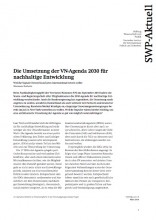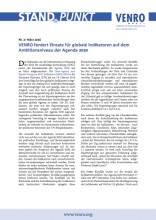Von Marianne Beisheim
Beim Nachhaltigkeitsgipfel der Vereinten Nationen (VN) im September 2015 haben die Staats- und Regierungschefs und -chefinnen aller Mitgliedstaaten die 2030-Agenda für nachhaltige Entwicklung verabschiedet. Auch die Bundesregierung hat zugesichert, die Umsetzung rasch angehen zu wollen, sowohl in Deutschland als auch weltweit mit Partnern und deutscher Unterstützung. Kanzlerin Merkel kündigte an, ehrgeizige Umsetzungsanstrengungen bereits im Juli in New York vorstellen zu wollen. Welche Impulse wären hierbei wichtig, um eine ambitionierte Umsetzung der Agenda so gut wie möglich voranzubringen?


